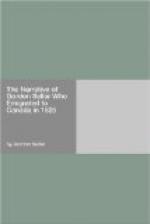We followed the cart that took the last of our luggage, forming quite a procession, and each one of us who was able carried something. I had a bag in one hand and an iron pot in the other. Grannie held a firm grip of Robbie, who she feared might be lost in Montreal, for the puir laddie hadna a word of French. On coming to the canal we were disappointed with both it and the boat. The canal was a narrow ditch and as to the boat, it was short and narrow and had no deck, except a few feet at either end. ‘We cannot live in that cockle-shell!’ exclaimed Mrs Auld. Her owner replied ‘She was one fine boat, new, built by Yankee.’ He was the only one of the crew who understood English, and was quick in his motions. He soon had all we brought with us stowed, and when a corner was found for the last chest, it was a surmise where the crew and passengers could find standing-room. The decked portions were allotted the women and children, the men and boys roosted on top of boxes and bales as they could. When all was ready, the conductor took the helm, the crew lined up on the bank with a tow-line over their shoulders, and off we started. The weather was fine and the country we passed beautiful. At the first locks we came to, the mistress stepped to a farmhouse beside the canal, and came back with the pail she had taken with her full of milk. It was the first the children had since we left Scotland. It was late in the day when the boat got to the end of the canal; the conductor, who told us to call him Treffle, said we would wait and have supper before going on the lake. Driftwood was gathered and fires made, pots and pans being set on stones. The crew fried fat pork, which, with bread, was their supper. We made porridge, for we had still a good supply of oatmeal, and of ship-biscuit. The sails were hoisted and we got away before it was quite dark. The wind was westerly, so we had to tack. Had it not been that the boat had a centreboard we would have made small progress. The centreboard was a novelty to us, and we could see how close it helped the little vessel to sail in the eye of the wind. The size of the lake surprised everybody and all the more when Treffle told us it was the St Lawrence. ’My, it is a big river and it is in a big country!’ exclaimed Mrs Auld. Everybody had to sleep as they best could; some slept sitting, more by leaning against one another, nobody had room to stretch himself. We were tired and glad to rest in any way. Mrs Auld said we were like herring in a barrel, packed heads and thraws. In waking at daylight we heard the sound of water dashing and roaring, and looking upwards saw the river tumbling downwards in great waves, which were, for all the world, like those of the Atlantic in a gale, except that they stayed in the same place. Treffle said these waves were due to the rushing water striking big rocks in the bed of the river, over which they kept pouring, and gave the name Cascades to the rapid. The boat was tied up, as the crew were to have breakfast




